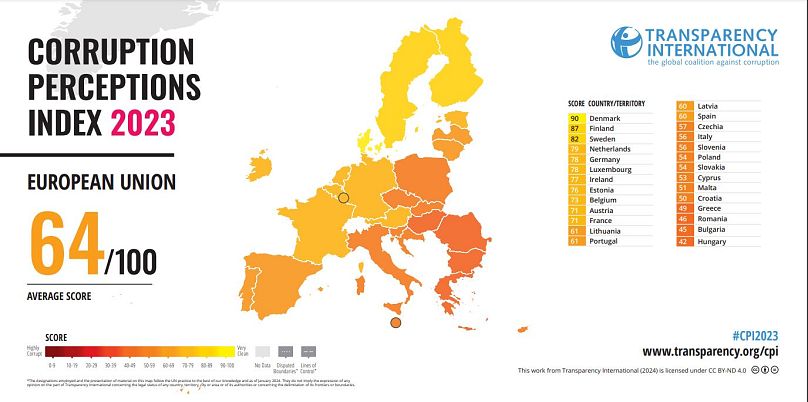Transparency International has released its latest report about anti-corruption efforts in Western Europe and the EU.
Corruption in Western Europe and the European Union is getting worse, according to experts' perceptions, and this is the first time it's got worse in over a decade.
 ADVERTISEMENT
ADVERTISEMENT
 ADVERTISEMENT
ADVERTISEMENT
Transparency International’s latest Corruption Perceptions Index (CPI) looked at 180 countries and territories by their perceived levels of public sector corruption on a scale of zero (highly corrupt) to 100 (very clean).
According to the report, experts and business people find that the world's least corrupt country is Denmark, followed closely by Finland and New Zealand in second and third place respectively.
Despite placing well in the overall list, several high-ranking democracies, such as Sweden (82), the Netherlands (79), Iceland (72) and the United Kingdom (71), recorded their lowest-ever scores in the annual CPI since it was first released in 2012.
"The fall of the regional CPI score in Western Europe and the EU demonstrates that European governments need to take the fight against corruption and upholding the rule of law more seriously," said Flora Cresswell, Transparency International's Western Europe regional coordinator.
"Rollbacks on checks and balances leave the door open to corruption," she said. "Countries must raise their standards and better enforce their own rules to step up efforts against corruption, shielding the justice system from interference and putting a backstop to powerful interest groups in politics."
Anti-corruption efforts have either stagnated or declined in over three-quarters of the countries in the region, according to Transparency International.
The best-performing countries were Denmark (90), Finland (87) and Norway (84), while the lowest-ranked ones were Hungary (42), Romania (46) and Bulgaria (45).
Out of 31 countries in this region, only six countries have significantly improved their score since 2012: the Czech Republic (57), Estonia (76), Greece (49), Latvia (60), Italy (56) and Ireland (77).
When compared to their scores in the 2015 CPI, Austria (71), Luxembourg (78), Sweden (82) and the United Kingdom (71) have declined significantly.
Poland (54) has also seen a seven-point decline over the past decade due to "efforts by the previous ruling Law and Order (PiS) party to monopolise power at the expense of public interest", said the report. It also highlighted that Greece (49) scored very low on the 2023 list due to its weak judicial independence.
Where can high-ranking countries improve on corruption?
However, even top-scoring countries have trouble curbing corruption in the public sector, according to the report, noting that they "have a poor record of prosecuting companies that pay bribes to win foreign markets".
The report highlights a case in the Netherlands (79), where authorities faced criticism for choosing not to prosecute Shell in a Nigerian oil bribery case, especially in the light of shocking acquittals in Italy over the same case.
Transparency International also refers to the recently proposed EU anti-corruption directive which, if adopted, would require member states to “make demand-side foreign bribery a crime."
Some EU countries have already criminalised both the supply and demand sides of foreign bribery. However, they rarely – if ever – move against foreign officials.
Some of the most notorious corruption scandals in recent history have involved money laundering through banks in EU countries such as Denmark (90), Germany (78) and Sweden (82). Their governments' failures to adequately supervise banks is one of the reasons why a new EU-level anti-money laundering authority is in the works.
While examining mainly African cross-border corruption cases, the report also found that Switzerland (82), although scoring high on the CPI, is still grappling with its status as a money laundering hub, where corrupt foreign elites can easily find intermediaries to create and manage companies and trusts for them.
However, a recently proposed piece of legislation aims to extend anti-money laundering obligations to lawyers and other professionals to curb this.
There is more to do for transparency in Ireland (77), where obtaining access to beneficial ownership registers is almost entirely hindered by a very complicated system, according to the report.
It says that this is also a problem in France (71), as a July 2023 analysis of company beneficial ownership data in the country showed that overall, it’s impossible to identify the beneficial owners of 61 % of all companies that hold real estate there.
In fact, Transparency International’s analysis found that access to information about companies’ real owners was significantly restricted for civil society and journalists across the EU.











